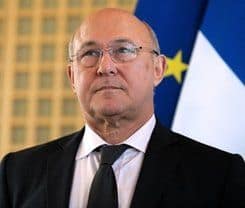The French government, which is hoping to reduce a potential BNP Paribas ten billion dollar fine, claims it is making progress after talking to US authorities. Michel Sapin, France’s Finance Minister said he hoped they were close to a settlement “because the uncertainty is not good for the French economy.”
US authorities want BNP Paribas, France’s largest bank, to plead guilty to doing business with countries that are subject to US sanctions, including Iran, Cuba and Sudan. New York’s regulators appear to have been pushing for a $10+ billion settlement.
Mr. Sapin did not give an estimate on what the size of the fine might be. He stressed that BNP should be allowed to help fuel growth in the French Economy.
BNP has a $1.1bn penalty fund
The French bank, which has set aside just $1.1 billion to cover penalties, admits the fines could be far in excess of that amount.
Benjamin Lawsky, head of New York’s Department of Financial Services, asked BNP Paribas to remove a senior adviser at the bank, Vivien Levy-Garboua, who was once head of compliance for the company in the US, as part of the settlement.
Mr. Lawsky has also proposed that BNP be temporarily banned from transferring funds (dollar clearing) through its New York offices on behalf of foreign clients, which he says would be better than losing its New York license. If PNB’s New York license were revoked it would effectively be out of business in the United States.
Decisions could affect markets, says Bank of France
Christian Noyer, governor of the Bank of France, said a suspension of BNP Paribas’ right to clear dollar trades may affect markets and undermine lending at a time when the European Central Bank is trying to get more liquidity into the economy.
BNP announced that another person Mr. Lawsky wanted fired, Chief Operating Officer Georges Chodron de Courcel, is leaving his post at the end of June and will retire in September.
BNP is likely to become the second major bank to plead guilty to criminal charges. In May, Credit Suisse pleaded guilty to helping rich Americans evade paying taxes in a settlement with US authorities costing $2.6 billion. The Swiss financial institution managed to hold onto its New York banking license.
According to French newspaper Le Monde, BNP Paribas was warned eight years ago by a high-ranking US Treasury official that it risked a hefty fine for breaking US sanctions. Three reports by legal experts in 2006 also warned the bank of the same risk.
Hollande appeals to Obama
French President, François Hollande wrote to US President Barack Obama in April saying that the penalties should not be “unfair and disproportionate.”
A $10 billion fine would be triple the combined penalties of ING Groep NV, Standard Chartered PLC and HSBC Holdings PLC in 2012 for violating sanctions. It would also be more than BNP’s estimated $7.6 billion earnings for this year.
Analysts say the fine would also affect BNP’s core equity tier one ratio, a measure of a financial institution’s ability to withstand market shocks and stress, pushing it down approximately 100 basis points from 10.6%, its current level.

On June 13th, EU Commissioner for financial services, Michel Barnier weighed in saying that BNP Paribas should be treated fairly.
US-EU trade deal under threat?
Several French lawmakers, including the President himself have said that such a gigantic fine could undermine the progress of a free trade agreement between the US and the European Union (EU).
On BFM TV, a French TV news channel, Mr. Noyer said:
“(Threatening to suspend dollar clearing is) something that can put in danger the good functioning of the international financial system because BNP Paribas is a big player in this area. I hope if there are sanctions in this area, they are limited in a way that is not dangerous.”
According to Reuters, US authorities are trying to determine whether BNP stripped out ID data from wire transfers so they could be sent through the American financial system without raising the alarm.
According to Mr. Sapin, if that alleged violation had been done in France in euros, “it would not have been reprehensible. That said, it is the American law, it should have been respected.”

